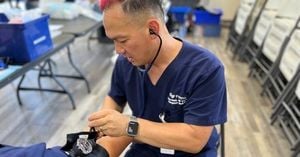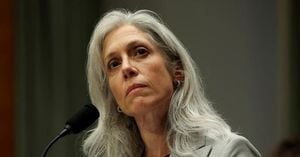The UK is currently grappling with significant outbreaks of bird flu, with confirmed cases reported across 27 farms, predominantly located in England and extending to one farm in Scotland. The alarming spread of this highly contagious disease has prompted several farming organizations to urge the UK government to permit vaccinations for poultry, aiming to curb the rising tide of infections.
Just recently, affected birds were identified on a commercial property situated in Norfolk, eastern England, resulting in their destruction to prevent any additional spread. Fortunately, health authorities have reported just one rare case of bird flu found in humans during this latest wave of outbreaks. They have reassured the public, stating the overall risk to human health remains very low.
Farmers, nonetheless, are sounding the alarm about the potential for these outbreaks to escalate. According to James Mottershead, who heads up the National Farmers' Union poultry board, it is of utmost importance for the long-term stability of the UK poultry sector to prioritize efforts on developing and implementing an avian influenza vaccination plan for birds.
Rising apprehensions about the impact of this outbreak are echoed by Gary Ford, spokesman for the British Free Range Egg Producers Association. Ford remarked, "We regard vaccination as potentially an important tool in terms of tackling this dreadful disease and preventing more flocks from being infected with avian influenza." Currently, the regulations prohibit vaccinations against bird flu within the UK, allowing them only for animals kept in zoos.
To counter the outbreaks, the environment department has instituted mandatory culling of birds located within three kilometers of any confirmed case. This strict measure is complemented by intensified hygiene protocols and broader control measures to manage the risk of spread.
At the heart of this issue is Minister for food security, Daniel Zeichner, who told parliament this week the government remains open to considering vaccinations. He did, though, caution against the significant international trade issues such decisions could provoke. The UK is recognized as one of the leading exporters of hatching eggs and day-old chicks, making the stakes even higher for farmers and governmental authorities.
The environment ministry has engaged actively, maintaining investments toward researching and developing vaccines through its specialized bird flu vaccination taskforce. Despite their diligence, there is understandable concern within the industry about how long it may take before any breakthrough is made. Feathered hopes are pinned on releasing the results of research before spring, but skepticism lingers as farmers face mounting economic pressures.
With poultry farming being integral to the UK's agricultural industry, the repercussions of this bird flu outbreak are far-reaching. Beyond the loss of life among infected birds, the industry's capacity to recover largely hinges on governmental support initiatives like allowing vaccinations to control future outbreaks.
Farming communities, burdened by economic distress, clearly seek aggressive action from the government. They want quick and effective measures to secure their operation's future. The continuation of strict culling practices, without the option for vaccination, is raising questions about long-term sustainability and food security for poultry producers.
Farmers are advocating for not just the continuation of existing practices but rather the advancement of proactive measures to protect flocks across the country. The highly contagious nature of avian influenza means they are continuously facing threats.
It is clear the situation requires careful monitoring as outbreaks continue across the UK. Farmers are now at a crossroads, facing uncertainty and economic challenges, all whilst fighting to protect their livelihood and maintain the resilience of the poultry industry.
Moving forward, as the government deliberates its next steps, including potential vaccination policies, the eyes of the agricultural community remain fixed on these discussions. The outcome of this situation could either pivot the poultry sector toward recovery or plunge it farther amid the peaks of avian influenza.
With the health of the poultry population hanging in the balance and the economic ramifications affecting producers' livelihoods at stake, the necessity for government intervention is more pressing than ever. Will the UK heed the call for vaccination support and help restore confidence within the agricultural sector? Only time will tell as the winter progresses, and farmers brace for whatever challenges may arise.



